英语语法--介词
小学英语语法-介词

小学英语语法-介词介词的定义介词是一种表示名词或代词与其他词之间关系的词类。
它可以表示时间、地点、方式、原因等关系。
常见的介词以下是小学英语中常见的介词及其用法:in:表示在某个地点或某个范围内。
例如:in the park(在公园里)、in the morning(在早上)。
in:表示在某个地点或某个范围内。
例如:in the park(在公园里)、in the morning(在早上)。
in:表示在某个地点或某个范围内。
例如:in the park(在公园里)、in the morning(在早上)。
on:表示在某个表面或某个特定日期。
例如:on the desk(在桌子上)、___(在星期一)。
on:表示在某个表面或某个特定日期。
例如:on the desk(在桌子上)、___(在星期一)。
on:表示在某个表面或某个特定日期。
例如:on the desk(在桌子上)、___(在星期一)。
at:表示在具体的时间或某个地点。
例如:at 7 o'clock(在7点)、___(在学校)。
at:表示在具体的时间或某个地点。
例如:at 7 o'clock(在7点)、___(在学校)。
at:表示在具体的时间或某个地点。
例如:at 7 o'clock(在7点)、___(在学校)。
to:表示向某个地点或某个目标。
例如:go to the supermarket (去超市)。
to:表示向某个地点或某个目标。
例如:go to the supermarket(去超市)。
to:表示向某个地点或某个目标。
例如:go to the supermarket(去超市)。
from:表示从某个地点或某个时间开始。
例如:___(从星期一到星期五)。
from:表示从某个地点或某个时间开始。
例如:___(从星期一到星期五)。
from:表示从某个地点或某个时间开始。
例如:___(从星期一到星期五)。
by:表示通过某种方式或某个工具。
英语语法----介词Preposition(Prep.)
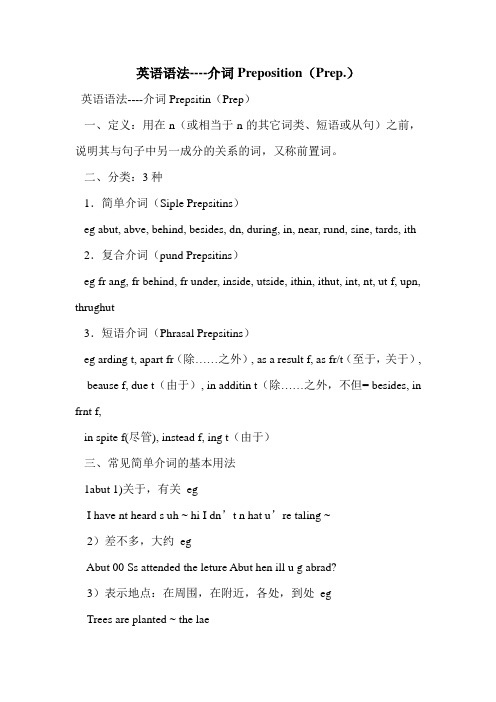
英语语法----介词Preposition(Prep.)英语语法----介词Prepsitin(Prep)一、定义:用在n(或相当于n的其它词类、短语或从句)之前,说明其与句子中另一成分的关系的词,又称前置词。
二、分类:3种1.简单介词(Siple Prepsitins)eg abut, abve, behind, besides, dn, during, in, near, rund, sine, tards, ith 2.复合介词(pund Prepsitins)eg fr ang, fr behind, fr under, inside, utside, ithin, ithut, int, nt, ut f, upn, thrughut3.短语介词(Phrasal Prepsitins)eg arding t, apart fr(除……之外), as a result f, as fr/t(至于,关于), beause f, due t(由于), in additin t(除……之外,不但= besides, in frnt f,in spite f(尽管), instead f, ing t(由于)三、常见简单介词的基本用法1abut 1)关于,有关egI have nt heard s uh ~ hi I dn’t n hat u’re taling ~2)差不多,大约egAbut 00 Ss attended the leture Abut hen ill u g abrad?3)表示地点:在周围,在附近,各处,到处egTrees are planted ~ the laeThe live sehere~ the Peple’s SquareDn’t leave ur bs~ ur des I haven’t an sall hange ~/n e 4)“即将”(近期将)egThe fil is ~ t begin It’s nearl 7:00 The train is ~ t leave2abve 1)在……上方egA bird is fling abve the ds There is a prtrait abve the blabard 2)(在数量上)超过egThe an is nt et frt, but ell ~thirtThe nuber f ne Ss this ear is ~fur hundred3)(能力等)胜过,超越;因太困难、太好而不…… eg The prble is ~ e (这问题太难我不懂。
英语语法----介词Preposition(Prep.)

英语语法----介词Preposition(Prep.)英语语法----介词Prepsitin(Prep)一、定义:用在n(或相当于n的其它词类、短语或从句)之前,说明其与句子中另一成分的关系的词,又称前置词。
二、分类:3种1.简单介词(Siple Prepsitins)eg abut, abve, behind, besides, dn, during, in, near, rund, sine, tards, ith 2.复合介词(pund Prepsitins)eg fr ang, fr behind, fr under, inside, utside, ithin, ithut, int, nt, ut f, upn, thrughut3.短语介词(Phrasal Prepsitins)eg arding t, apart fr(除……之外), as a result f, as fr/t(至于,关于), beause f, due t(由于), in additin t(除……之外,不但= besides, in frnt f,in spite f(尽管), instead f, ing t(由于)三、常见简单介词的基本用法1abut 1)关于,有关egI have nt heard s uh ~ hi I dn’t n hat u’re taling ~2)差不多,大约egAbut 00 Ss attended the leture Abut hen ill u g abrad?3)表示地点:在周围,在附近,各处,到处egTrees are planted ~ the laeThe live sehere~ the Peple’s SquareDn’t leave ur bs~ ur des I haven’t an sall hange ~/n e 4)“即将”(近期将)egThe fil is ~ t begin It’s nearl 7:00 The train is ~ t leave2abve 1)在……上方egA bird is fling abve the ds There is a prtrait abve the blabard 2)(在数量上)超过egThe an is nt et frt, but ell ~thirtThe nuber f ne Ss this ear is ~fur hundred3)(能力等)胜过,超越;因太困难、太好而不…… eg The prble is ~ e (这问题太难我不懂。
小学英语语法详解---介词(表示地点的介词)

小学英语语法详解介词——表示地点的介词1) 表示地点(包括动向)的介词① at, in, on, toat表示在小地方:I arrive at school at nine every morning.我每天早上九点到校。
表示“在……附近,旁边”The Smiths are at the beach.史密斯一家在沙滩上。
in表示在大地方:When did you arrive in Beljing?你什么时候到北京的?表示“在……范围之内”:The penclis in the pencl-box.铅笔在铅笔盒里。
on表示毗邻,接壤,“在………上面”Mongolia is on the north of China.蒙古在中国的北面。
表示在某物体上面并与之接触:He put his watch on the table.他把手表放桌上。
to表示“在……范围外”不强调是否接壤:或“到……”:Japan is to the east of China.日本在中国的东面。
②above, overabove指“在……上方”,不强调是否垂直,与below相对:The bird is flying above my head.鸟儿在我头顶上飞过。
over指垂直的上方,与under相对,over有覆盖的含义在里面:There is a bridge over the river.江上有座桥。
③below, underunder表示“在……正下方”:There is a cat under the table.桌子下面有只猫。
below表示“在……下方”,不一定在正下方:Please write your name below the line.请在线的下方写上您的名字。
④in front of, in the front ofin front of“在……前面”,指甲物在乙物之前,两者互不包括:其反义词是behind (在……的后面):There are some flowers in front of the house.房子前面有些花卉。
英语语法 介词

英语语法介词介词是虚词,介词不能单独作句子成分,只能用在名词、代词或作用相当于名词的其他词、词组或从句之前,与之一起构成介词短语充当句子成分。
介词在英语中用得极为广泛、灵活,可组成许多成语和习惯用法,因此学习时要特别注意。
1.介词的种类(1)简单介词on,in,with,by,for,about等(2)合成介词into,out of,as for,without(3)短语介词by means of,because of,according to,in respect of,in contrast with,in spite of(4)分词介词including,concerning,considering,regarding,provided,given2.介词短语介词短语是由介词和构成介词短语的那部分名词或相当于名词的其他词或短语构成的。
主要有下列几种:(1)介词+名词Aluminum and zinc can easily combine with the oxygen in the air. 铝和锌很容易与空气,户的氧化合。
(2)介词+代词How much luggage can I take with me?我能带多少行李?(3)介词+动名词You learn to speak English by speaking it. 你用说英语这种方式来学说英语。
(4)介词+数词Everything divides into two. 事物都是一分为二的。
(5)介词+另一个介词短语The air was removed from between the two pipes. 空气已从两管之间抽出。
(6)介词+形容词或副词It is far from satisfactory.We have made some progress,but it is far from enough.我们已经取得了一些进步,但还远远不够。
介词,英语语法-词类4

for表示“去”目的地方向, 常与leave, bound, depart, set out, start连用。 We are leaving for Guangzhou tomorrow. 我们明天去广 州。 to表示 “到达”动作的目的地,常与fly, walk, drive, come, go, return, move, run等连用, 和shout, throw连用表示动作 的对象。 They ran to the hospital and shouted to me. 他们跑到医院 朝我大喊。 towards表示 “朝…方向”, 没有到达之意. They ran towards the hospital. 他们朝医院跑去。(跑向) from表示动作的起点 “从…” Her uncle has returned from India.她叔叔从印度回来了。
17
表示 “除了”的介词 besides “除…外”(还有, 其余相同), 具有肯定 性质, 常和more, else, other, another 等连用。 What else did you do besides writing the letter? except (but) “除…外再没有”, 不包括在范围内 具有否定性质。常与no, none, all等词连用。 We study all subjects except arts. except for “除了有…外”, for后的内容与前面 不同类或是前面内容的一部分。 Your composition is good except for a few spelling mistakes. except that +从句 Your composition is good except that there are a few spelling mistakes.
初中英语语法-介词
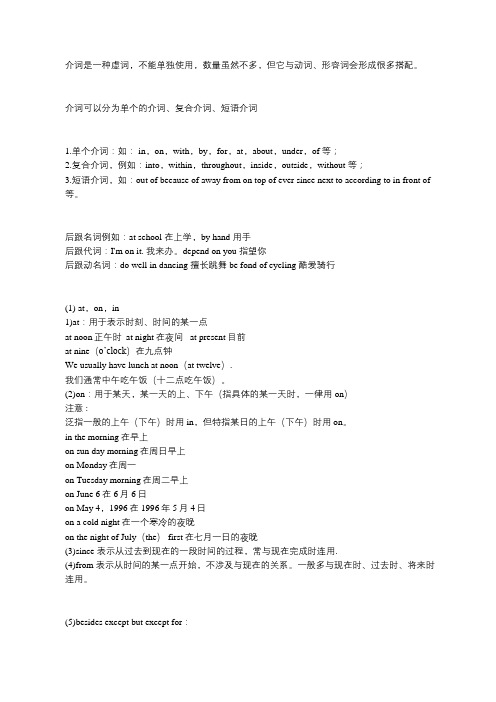
介词是一种虚词,不能单独使用,数量虽然不多,但它与动词、形容词会形成很多搭配。
介词可以分为单个的介词、复合介词、短语介词1.单个介词:如: in,on,with,by,for,at,about,under,of 等;2.复合介词,例如:into,within,throughout,inside,outside,without 等;3.短语介词,如:out of because of away from on top of ever since next to according to in front of 等。
后跟名词例如:at school 在上学,by hand 用手后跟代词:I'm on it. 我来办。
depend on you 指望你后跟动名词:do well in dancing 擅长跳舞be fond of cycling 酷爱骑行(1) at,on,in1)at:用于表示时刻、时间的某一点at noon正午时 at night在夜间 at present目前at nine(o’clock)在九点钟We usually have lunch at noon(at twelve).我们通常中午吃午饭(十二点吃午饭)。
(2)on:用于某天,某一天的上、下午(指具体的某一天时,一律用on)注意 :泛指一般的上午(下午)时用in,但特指某日的上午(下午)时用on。
in the morning在早上on sun day morning在周日早上on Monday在周一on Tuesday morning在周二早上on June 6在6月6日on May 4,1996在1996年5月4日on a cold night在一个寒冷的夜晚on the night of July(the) first在七月一日的夜晚(3)since 表示从过去到现在的一段时间的过程,常与现在完成时连用.(4)from 表示从时间的某一点开始,不涉及与现在的关系。
小学英语语法--介词
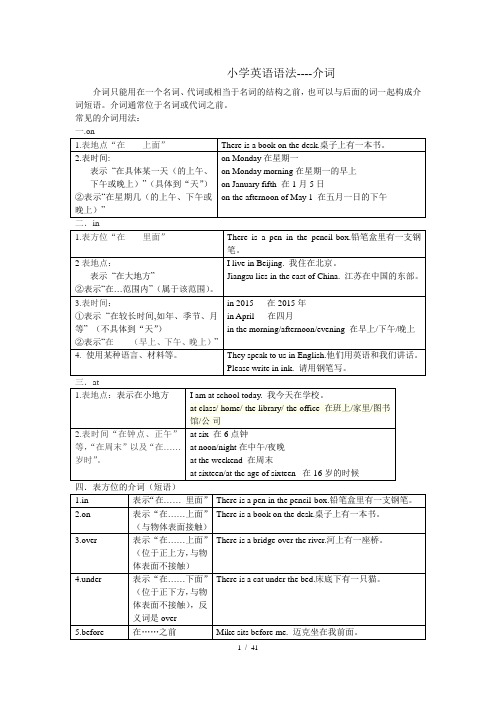
小学英语语法----介词介词只能用在一个名词、代词或相当于名词的结构之前,也可以与后面的词一起构成介词短语。
介词通常位于名词或代词之前。
常见的介词用法:一.on二.in四.表方位的介词(短语)练一练用适当的介词填空1.My father begins work ________ 8:00 ________ the morning .2.Do the students stay ________ home ________ Saturday?3.My mother cut the cake ________ a knife4.We live______ a new house now.5.Shanghai is ____ the east of China.6. I usually have lunch ____ noon.7. It’s eight o’clock. It’s time ________ class.8. _____ half past six , he usually has dinner.9. We have lessons _____eight o’clock ___ twelve o’clock.10.I go there _____ my friend _____ bike.11.There is a bridge_____ the river.12.This is a photo _____ my family.13.Tom comes _____ England.14.My bed is _____ the window.15.He looks_____ his father.16.What's this _____ English?17.The pen is_____ the pencil-box.18. The bookstore is_____ the right of our school.19.There are some pictures _____ the wall.20.My telephone is _____the bed and the sofa.答案:1. at; in 2.at; on 3.with 4. in 5.in 6.at 7.for 8.At 9.from; to 10. with; by 11. over 12. of 13. from 14. near 15. like 16. in 17. in 18. on19.on 20.between。
英语语法手册—介词篇
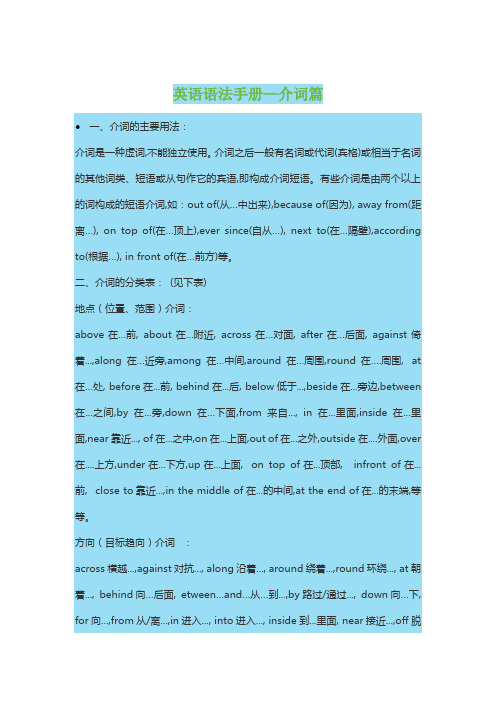
英语语法手册—介词篇一、介词的主要用法:介词是一种虚词,不能独立使用。
介词之后一般有名词或代词(宾格)或相当于名词的其他词类、短语或从句作它的宾语,即构成介词短语。
有些介词是由两个以上的词构成的短语介词,如:out of(从…中出来),because of(因为), away from(距离…), on top of(在…顶上),ever since(自从…), next to(在…隔壁),according to(根据…), in front of(在…前方)等。
二、介词的分类表:(见下表)地点(位置、范围)介词:above在…前, about在…附近, across在…对面, after在…后面, against倚着...,along在…近旁,among在…中间,around在…周围,round在….周围, at 在…处, before在...前, behind在...后, below低于...,beside在...旁边,between 在...之间,by在...旁,down在...下面,from来自..., in在...里面,inside在...里面,near靠近..., of在...之中,on在...上面,out of在...之外,outside在....外面,over 在....上方,under在...下方,up在...上面, on top of在...顶部, infront of在...前, close to靠近...,in the middle of在...的中间,at the end of在...的末端,等等。
方向(目标趋向)介词:across横越...,against对抗..., along沿着..., around绕着...,round环绕..., at朝着..., behind向…后面, etween…and…从…到...,by路过/通过..., down向…下, for向...,from从/离...,in进入..., into进入..., inside到...里面, near接近...,off脱离/除...,on向...上,out of向...外,outside向....外,over跨过..., past经过/超过...,through穿过..., to向/朝...,towards朝着..., on to到...上面,onto到...上面,up向...上,away from远离...时间介词:about大约...,after在…以后,at在…(时刻),before在…以前,by到…为止,during 在…期间,for有…(之久),from从…(时)起, in在(上/下午);在(多久)以后, on在(某日), past过了…(时), since自从…(至今), through 贯穿…(期间), till直到…时, until直到…时, to到(下一时刻), ever since从那时起至今,at the beginning of 在...开始时,at the end of在...末, in the middle of在...当中,at the time of 在...时方式介词:as作为/当作..., by用/由/乘坐/被..., in用…(语言), like与…一样,on骑(车)/徒(步),通过(收音机/电视机), over通过(收音机), through通过...,with用(材料),用(手/脚/耳/眼), without没有…涉及介词:about关于...,except除了…, besides除了…还...for对于/就…而言, in在…(方面), of…的,有关..., on关于/有关..., to对…而言, towards针对...,with就…而言其它介词:[目的介词] for为了..., from防止…, to为了…[原因介词] for因为..., with由于…, because of因为...[比较介词] as与…一样,like象…一样,than比...,to与…相比,unlike与…不同[伴随/状态介词]against和…一起(比赛),at在(上班/休息/上学/家,etc.),in穿着…(衣服/颜色),into变成...,on在(值日),with与…一起,有/带着/长着..., without没有/无/不与…一起三、介词短语的句法作用:介词短语相当于一个形容词或副词,可用作状语、定语和表语。
全新英语语法——介词
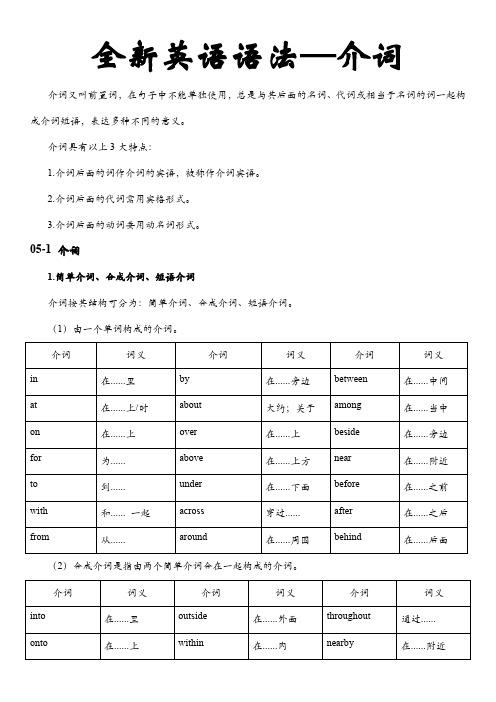
全新英语语法—介词介词又叫前置词,在句子中不能单独使用,总是与其后面的名词、代词或相当于名词的词一起构成介词短语,表达多种不同的意义。
介词具有以上3大特点:1.介词后面的词作介词的宾语,被称作介词宾语。
2.介词后面的代词需用宾格形式。
3.介词后面的动词要用动名词形式。
05-1 介词1.简单介词、合成介词、短语介词介词按其结构可分为:简单介词、合成介词、短语介词。
(1)由一个单词构成的介词。
(2)合成介词是指由两个简单介词合在一起构成的介词。
(3)短语介词是指一个或两个简单介词与一个或几个其他词类的词组合,在意义和作用上相当于一个简单介词的词。
如:2.时间介词、方位介词、其他介词介词根据其意义可分为表示时间的介词、表示方位空间的介词、表示其他意义的介词。
(1)表示时间的介词常用的有:(2)表示方位空间的介词常用的有:(3)表示其他意义的介词常用的有:05-2 介词短语与短语介词1.介词短语介词短语是指由介词后接宾语构成的短语,如:in the room在房间里;at the station在火车站;on the desk在课桌上;under the tree在树下We heard a strange sound in the room.An official at the station said the train would arrive late.2.短语介词短语介词是指由短语构成的介词,如according to根据,because of因为,in spite of尽管等。
He walk slowly because of his bad leg.According to the timetable,the train gets in at 8:27.05-3 介词的宾语介词后的介词或相当于名词的词叫作介词的宾语。
可作介词宾语的词通常是名词、代词、数词、动名词、含有疑问词的不定式短语等。
I live near the city center,but I work far from that.(名词、代词作介词的宾语)Four from ten leaves six.(数词作介词的宾语)I’m looking forward to receiving your letter.(动名词作介词的宾语)Could you give me some advice on how to learn English better?(动词不定式与疑问词连用作介词的宾语)05-4 介词的用法介词不能单独使用,介词和介词的宾语一起构成介词短语,在句中作主语、表语、补足语、定语、状语、插入语。
高中英语语法知识汇总:介词
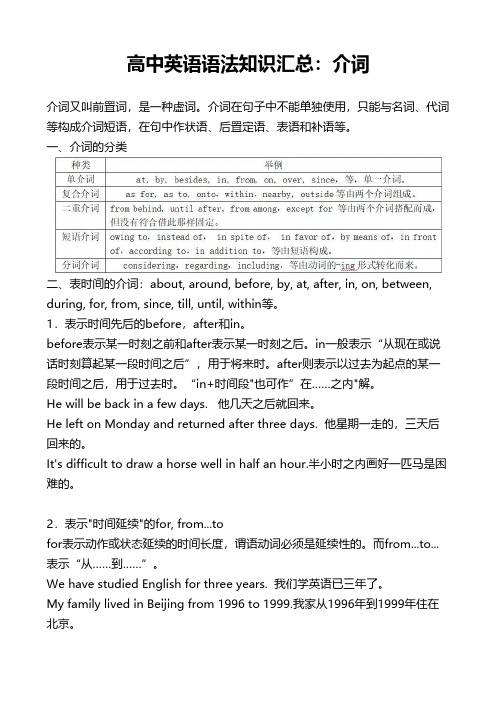
高中英语语法知识汇总:介词介词又叫前置词,是一种虚词。
介词在句子中不能单独使用,只能与名词、代词等构成介词短语,在句中作状语、后置定语、表语和补语等。
一、介词的分类二、表时间的介词:about, around, before, by, at, after, in, on, between, during, for, from, since, till, until, within等。
1.表示时间先后的before,after和in。
before表示某一时刻之前和after表示某一时刻之后。
in一般表示“从现在或说话时刻算起某一段时间之后”,用于将来时。
after则表示以过去为起点的某一段时间之后,用于过去时。
“in+时间段"也可作”在……之内"解。
He will be back in a few days. 他几天之后就回来。
He left on Monday and returned after three days. 他星期一走的,三天后回来的。
It's difficult to draw a horse well in half an hour.半小时之内画好一匹马是困难的。
2.表示"时间延续"的for, from...tofor表示动作或状态延续的时间长度,谓语动词必须是延续性的。
而from...to...表示“从……到……”。
We have studied English for three years. 我们学英语已三年了。
My family lived in Beijing from 1996 to 1999.我家从1996年到1999年住在北京。
3.表示"时限"的介词since, from, by, until(till)since表示动作的起始点,其意是 "从……以来 ",常与完成时态连用。
英语语法大全-介词

英语语法大全-介词
介词(Preposition—prep.)
定义置于名词或名词同等语之前组成一个表意单位(短语),用以说明该名词或名词同等语与句子中其他词之关系的词叫做介词(也译作前置词)。
例如:
at,by,in,of,on,to,with,etc.
because of(因为),in front of(在……的前面),etc.
介词之后的名词、代词等叫做介词的宾语,其所组成的表意单位可以如下型式表达:
介词短语在句子中的表达功能如下:
(1)作名词用
A mouse ran out from under the wall.
(有一只老鼠从墙底下跑出来了。
)
解说介词短语“under the wall”在本句中是作其前面的介词“from”的宾语用,因此其功能是等于一个名词,而这样用的介词短语称为名词短语(Noun phrase)
(2)作形容词用
Bring me the book on your desk.
(把你桌子上的那本书拿来给我。
)
解说介词短语“on your desk”在本句中是在修饰名词“book”,因此其功能是等于一个形容词,而这样用的介词短语称为形容词短语(Adjective phrase)。
(3)作副词用
They are studying quietly in the classroom.
(他们正在教室里安静地读书。
)
解说介词短语“in the classroom”在本句中是在修饰动词“are studying”,因此其功能是等于一个副词,而这样用的介词短语称为副词短语(Adverbial phrase)。
高中英语语法------介词
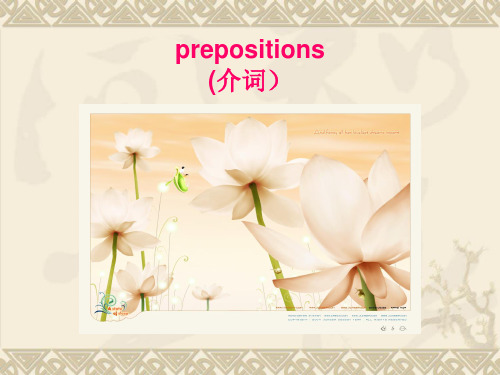
时), at Mid-autumn(在中秋节时), at Christmas(在圣诞节时)
2) in 用来表示某年、某月、季节、上下午、傍晚等时间 in 1998\ in May, \in May, 1998\in the morning\afternoon\evening,
prepositions (介词)
常见介词
over
above
一.方位介词
on
beneath
1. above\over\on\below\under\beneath
under below
Be careful, there is a heavy box__o_v_e_r_ your head.
The sun is _a_b_o__ve the mountain in the east.
There are some stamps___o_n___the desk.
The position he pointed to was _a_b_o_v__e_\below the sea level.
The little mouse is _u_n_d_e_r the table, so it is not easy to find
at 表示在较小的地方(门牌); 在某物旁(不确定的地方) in 表示在较大的地方(国家,城市); 在某物范围内.(地点的排列
顺序是由小到大). on 表示在某物上(表面接触); road 前用on, street前用in/on;
楼层用on; farm前用on, field前用in.
at 116 Changhe Street. at the station\airport\at the theatre\the party\the meeting\ conference---at the end of \ at the bottom of \ at the foot of \---
高中英语语法-介词

5.表示其他意义的介词 1)on ,about 关于 on 表示书,文章或研究是关于某方面题材,话 题的, 学术性的, about表示内容较为普通,不那么正式。 He is writing a book on cooking. He told me a lot about his vacation.
其他表示时间的用法: in, after 在……之后 “in +段时间”表示将来的一段时间以后; “after+段时间”表示过去的一段时间以后; “after+将来点时间”表示将来的某一时刻以后。 My mother will come back in three or four days. He arrived after five months. She will appear after five o’clock this afternoon.
on a, 表示具体某一天, on May 1st b, 表示在周几及特定的早、中、晚。 on Monday, on Sunday afternoon, on a cold night c, 表示在节日(那天), on New Year’s Day
in a, 表示一天中的早、中、晚, in the morning, in the evening. b, 表示较长的时间段,如月份,季节, 年份,世纪等. in the 20th century, in 1989, in summer, in May.
from, since 自从…… from仅说明什么时候开始,不说明某动作或 情况持续多久; since表示某动作或情况持续至说话时刻,通 常与完成时连用。 He studied the piano from the age of three. They have lived here since 1978.
英语语法----介词Preposition(Prep.)

英语语法—-介词Preposition(Prep.)什么是介词(Preposition)?在英语语法中,介词(Preposition)是连接名词、代词、动词或形容词与其他词或短语的一类词汇。
介词用来表示位置、时间、方向、方式、原因等概念。
介词通常放置在名词或代词之前,这种结构被称为介词短语(Prepositional Phrase)。
介词的用法表示方向和位置介词在英语中经常用来表示方向和位置。
以下是常见的方向和位置介词:•in:表示在某个物体或地点之内。
例如:in the room(在房间里);in London(在伦敦)。
•on:表示接触或在某个表面之上。
例如:on the table(在桌子上);on the wall(在墙上)。
•at:表示接触或在某个特定位置。
例如:at the bus stop(在公交车站);at the front(在前方)。
表示时间介词也常用来表示时间。
以下是常见的时间介词:•in:表示在未来的某个特定时间之后或在未来某一段时间内。
例如:in an hour(在一个小时内);in September(在九月)。
•on:表示在某个具体日期或星期几。
例如:on Monday(在星期一);on July 4th(在七月四日)。
•at:表示在某个特定时间点。
例如:at 8 o’clock(在八点钟);at noon(在中午)。
表示方式和原因介词还可以用来表示方式和原因。
以下是常见的方式和原因介词:•by:表示通过某种方式。
例如:go to school by bus(乘坐公交车去学校);learn by doing(通过实际操作学习)。
•with:表示伴随或带有某种特征。
例如:go out with friends(和朋友们一起出去);a house with a garden(带花园的房子)。
•because of:表示因为某个原因。
例如:I couldn’t come because of the rain (因为下雨,我不能来);He failed the exam because of his laziness(因为懒惰,他考试失败了)。
英语语法-介词及介词词组

英语语法-介词及介词短语介词的功能介词是一种虚词,用来表示名词或相当于名词的其它词语句中其它词的关系,不能单独使用。
介词可与名词或相当于名词的其它词构成介词短语。
介词短语可在句中作定语,状语,表语和宾语补足语。
The boy over there is John’s brother. (定语)The girl will be back in two hours. (状语)Our English teacher is from Australia. (表语)Help yourself to some fish. (宾语补足语)种类(1) 简单介词,常用的有at, in, on, about, across, before, beside, for , to, without等。
(2) 复合介词,如by means of, along with, because of, in front of, instead of等。
常用易混介词辨析一.表示时间的介词1)at, in, onat一般指小地方;in一般指大地方或某个范围之内;on往往表示“在某个物体的表面”。
He arrived in Shanghai yesterday.They arrived at a small village before dark.There is a big hole in the wall.The teacher put up a picture on the wall.2)in front of, in the front ofin front of 表示“在某人或某物的前面”,在某个范围以外;in the front of 表示“在……的前部”,在某个范围以内。
例如:There are some tall trees in front of the building.The teacher is sitting in the front of the classroom.3)across / through / over / by 经过across 指横穿,穿过. 表示动作从某一物体表面上经过. The dog ran across the grass. through 指穿过,透过,表示从某一物体空间内通过. They walked through the forest.over 表示从某人或某物的上空经过或越过,不与表面接触.I don’t think anyone can jump over the fence.by 表示从某人/某物的旁边经过I walked by the bank of China yesterday .4between :指两者之间. 在…….之间.among :用于三者或三者以上人或物之间. 在……之中6)介词in /on / to 表方位:1.in表示A地在B地范围之内.(包含关系) Tanwan is ____ the southeast of China .2.on表示A,B地接壤.(外切关系) Hubei is ____ the north of Hunan .3.to表示A,B两地有一定的间距.(外离关系) Japan is _____ the east of China.7)①动词+介词look up查看,查(字典)think of想起,想到;hear from sb.收到某人的信;talk about sth.谈论某事;talk to/with sb.和某人谈论;look at注视;call on sb.拜访某人;take care of照顾;wait for等待;look for寻找add…to 加到……上agree with 同意(某人) ask for 询问believe in 相信break into 闯入break off 打断break out 爆发bring down 降低bring in 引进bring up 教育,培养build up 建起burn down 烧光call back 回电话call for 要求约请call in 召来call on 拜访访问carry on 继续开展carry out 实行开展check out 查明结帐clear up 整理,收拾come about 发生,产生come across (偶然)遇见come out 出来come to 共计达到compare…with 与……比较compare to 比作cut off 切断date from 始于depend on 依靠devote to 献于die out 灭亡divide up 分配dream of 梦想fall off 下降fall over 跌倒feed on 以……为食get down to 专心于get through 通过give in 让步,屈服give out 分发give up 放弃go abroad 出国go against 反对go through 浏览grow up 生长hand down 传下来hear about 听说 hold out 伸出 join up 连接起来keep off 让开,不接近 keep on 继续 lead to 导致live on 靠……为生 look down upon 看不起 look forward to 盼望look into 调查 look out 当心 look(a) round 仔细查看set off 动身 set up 建立 show off 炫耀 shut up 住口speed up 加速 stand for 代表,象征 stick to 坚持suffer from 遭受 talk of 谈论 think of 考虑,想起turn down 调低 turn off 关掉 worry about 担心② Be动词+形容词+介词be kind to对(某人)亲切;be good at在……做得好;擅长于…… be late for迟到;be afraid of害怕;be sorry for sth.为……抱歉;be absent from缺席;be proud of以……为自豪;be found of 喜欢be full of 充满be interested in 对…有兴趣be keen on 热衷于be confident in 对…有信心be short of 缺乏be sick of 厌恶be proud of 对…感到骄傲be loyal to 对…忠诚be ashamed of 为…感到羞耻be worried about 为…担心be aware of 意识到be busy with 忙于(某事) be different from 和…不同③介词+名词1)英语中有大量成语由介词构成,单是一些常用介词就可构成大量成语:at:at a stretch 一连,连续地at a time 一次,每次at ease 稍息,安心at first sight 一见(钟情) at first 最初,开始时at heart 在内心at home 在家,随便at last 最后at least 至少at length 最后,详细地at most 至多at once 立即,同时at peace(war) 处于和平(战争)状态at play(work) 在玩耍(工作)at present 现在,目前at random 随意地,胡乱地at the risk of 冒…的风险at the same time (与此)同时at the start 一开头at the time 此刻,这时at times 有时候at will 任意地by:by accident 偶然by air 航空by all means 想一切办法by bus (plane, etc) 坐巴士(飞机等) by chance 偶然by cheque 用支票by choice 出于自愿by daylight 在大白天by day(night) 白天(夜间)by force 靠武力by mistake 错误地,误把… by tu rns 轮流by surprise 突然,出其不意by the way 顺便说一句in:in a sense 从某种意义上说in addition(to) 此外(除…之外) in advance 事前in all 总共in any case (event) 不管怎样,反正in brief 简而言之in case 要是,如果in case of 在…情况下in comparison 比较起来in danger 处于危险中in debt 负债in demand 有需求in detail 详细地in fact 实际上in general 一般说来in one’s opinion 在(某人)看来in order to (that) 以便,为了in other words 换句话说in part(s) 部分地in person 亲自in practice 实际上in public(private) 公开(私下)地in regard to 关于in short 总之in the end 最后in the middle of 在…中间in time 及时地in vain 白白地,没有结果on:on account of 由于on behalf of 代表(某人) on board 在船(飞机)上on condition 在…条件下on duty 值班on fire 着火on foot 步行on guard 有警惕,值班on hand 在身边on holiday 在休假on purpose 故意地on sale 在出售on strike 罢工on the contrary 相反on the way 在路上on time 准时on the top of 在…上面on the run 正在逃窜out of:out of action 失灵out of breath 气喘吁吁out of control 失去控制out of danger 脱离危险out of doors 在户外out of fashion 不时新out of hand 失去控制out of order 坏了out of reach 无法得到(拿到)out of sight 看不见out of temper 发脾气out of question 不可能out of touch(with) 和…失去联系out of tune 走调out of use 不再使用out of work 失业2)有些介词夹在名词之间构成成语:day after day 日复一日地year after year 年复一年one after another 一个接一个地one by one 一个接一个little by little 一点一点地side by side 并肩step by step 一步步地face to face 面对面arm in arm 手挽手地hand in hand 手牵手地day to day 日常的day by day 一天一天地day before yesterday 前天day after tomorrow 后天heart to heart 互相交心的3)还有一些成语包含两个介词:from beginning to end 从头至尾from bad to worse 越来越糟from time to time 不时地from head to foot 浑身from morning to night 从早到晚from start to finish 从头至尾from door to door 挨门挨户地from place to place 到各地单选1.The worker can make chairs ____ wood, and also can make paper ____ wood.A. from, ofB. of, fromC. of. ofD. from, from2. Mary dropped in ____ Mr Smith, but he wasn' t at home, so she went to drop in ____ Mr Smith's office.A. on, onB. at, atC. on. atD. at. On3. The teacher is not only strict ____ his pupils but also strict ____ his own work.A. with, withB.in,inC. in, withD. with, in4. His grandfather died ____ the wound that the enemy soldier had given him .and then his grandmother died ____ hungry and cold.A.from,ofB.of,fromC.from,fromD.of.of5. This is a common mistake ____ students.A. betweenB.overC. amongD. about6. My father began to work ____ a bus driver when he was twenty years old.A.forB.toC.atD.as7. _____ hearing the news, I was wild ____ joy.A. At, inB. On, withC. After, byD. /, over8.I don' t think Xiao Li is ____ the other students ____ mathematics.A. after, onB. after, withC. behind, inD. behind, at9. It happened ____ the Long March.A. duringB.inC.atD.for10. It's very kind____ you to repair the bike ____ me.A.for.forB.of,ofC.of,forD.for,of11. Fresh air is good ____ your health.A.atB.forC.ofD.to12.The group is made up____five- students. And they are studying hard to make up____ the lost time.A.of,ofB.for,forC.of,forD.for,of13.The PLA man saved the boy ____ death.A. ofB.fromC.toD.on14. He went to Beijing and returned ____ three days.A. inB. beforeC. laterD. after15. Do you often hear____ your brother?A. ofB. fromC. out ofD. about16. We walked ____ the Tian An Men Square to the Museum of Chinese History.A. acrossB. throughC.byD.past17.____ the sun, nothing would grow. A. For B.With C. Under D. Without1-5bcdac 6-10dbcac 11-15bcbdb 16-17ad。
- 1、下载文档前请自行甄别文档内容的完整性,平台不提供额外的编辑、内容补充、找答案等附加服务。
- 2、"仅部分预览"的文档,不可在线预览部分如存在完整性等问题,可反馈申请退款(可完整预览的文档不适用该条件!)。
- 3、如文档侵犯您的权益,请联系客服反馈,我们会尽快为您处理(人工客服工作时间:9:00-18:30)。
(一)介词的定义:介词是一种用来表示词与词,词与句之间的关系的词。
(二)介词的分类:i.时间介词in:早午晚年月季E.g.in the morning,in 2018,in January,in springon:具体日期,某一天的上下午晚上E.g.on August 8th ,2008;on morning of August 8th ,2008;on a cold nightat:午夜点与分E.g.at night,at noon,at 8o’clockii.方位介词on,inover,under,above,below一、语法总结iii.易混介词in front of,in the front of在……前面behind,in the back of在……后面between,among在……中间二、语法练习Ⅰ.随堂测一、客观题(请在APP作答)1.We can have dinner____7o'clock.A./B.inC.onD.at2.We are going to have a meeting at9:00____Monday morning.A.onB.inC.byD.at3.My friend,Henry,was born____June10th,1997.A.inB.onC.atD.for4.—When were you born,Lucy?—I was born____November11th,1994.A.atB.onC.forD.in5.Jerry goes to the swimming class____Saturday afternoons.A.inB.atC.onD.for6.The aeroplane is flying____the village.A.overB.onC.underD.off7.Tom told me his parents had arrived____Beijing.A.atB.onC.inD.to8.There is a boy____the water.A.onB.inC.betweenD.of9.Music has become a bridge____the East and the West.A.inB.atC.amongD.between10.The driver sits____the bus.A.in front ofB.in the front ofC.behindD.front二、主观题(需用拍照提交至APP,由辅导老师批改)1.Christmas is______the25th of December.2.We are going to meet____half past ten.3.He left home____a cold winter evening.4.We live____a new house now.5.The workers will build a new railroad______the two cities.Ⅱ.拓展练习(补充练习题,不需要提交)1.The western people usually have a good time with friends____Christmas Day.A.atB.inC.ofD.on2.—Lucy,where were you born?—I was born____Shanghai.A.atB.inC.onD.by3.My brother was born____the morning of July8th,2005.A.inB.atC.onD.of4.It’s very nice to have some tea____Saturday afternoon.A.inB.onC.atD./5.It is very late,do not go out____.A.in the morningB.at nightC.in the afternoonD.in evening6.Over10,000runners joined a half and a mini marathons in Xianlin,Nanjing____May7,2017.A.inB.onC.atD.by7.Wow!Ten students in our class will celebrate their fourteenth birthdays____October!A.inB.onC.atD.to8.—When is the concert?—It's____three o'clock____the afternoon of July18th.A.at;inB.at;onC.on;inD.in;on9.Mike often reads newspapers_____seven_____the evening.A.at,atB.at,inC.in,inD.in,at10.The Blacks came to China_____June10th,2005.A.onB.atC.inD.of11.He arrived_____Guangzhou_____noon.A.in;atB.at;atC.at;inD.in;in12.I’m going to see him____November.A.onB.inC.atD.of13.There is a desk____the blackboard.A.in frontB.in the front ofC.in front ofD.in the front14.The Mother's Day is____the second Sunday in May in the United States.A.onB.inC.atD.of15.There are three pens____the desk.A.inB.onC.byD.of16.We arrived____the station five minutes late.A.atB.inC.onD.towards17.Einstein,the famous scientist,was born____March,1879.A.atB.onC.inD.to18.The accident happened____a cold winter morning.A.inB.onC.atD.of19.They arrived______Shanghai______a cold morning.A.in;inB.in;onC.at;onD.at;in20.We usually have a nap____noon in the office.A.onB.withC.inD.at拓展练习答案解析1.【答案】D【解析】考查介词。
节日若是Day,表示具体某天,一般用on,如on Christmas Day,但要注意是at Christmas。
故选D。
2.【答案】B【解析】考查介词的用法。
句意:—Lucy,你在哪里出生?—我出生在上海。
在某处用in。
故选B。
3.【答案】C【解析】考点:考查介词的用法。
句意:我的弟弟出生于2005年7月8日的上午。
具体到某一天的早晨、下午、晚上用介词on。
故答案为C。
4.【答案】B【解析】句意:在星期六下午喝茶非常好。
根据句意及题干分析具体到某一天的上午、下午和晚上要用介词on,故选B。
5.【答案】B【解析】试题分析:考查短语辨析。
句意:太晚了,晚上不要出去。
根据It is very late可知答案为B。
At night意为在晚上,在夜里;in the morning意为早上;in the afternoon意为在下午;没有in evening的搭配。
故选B。
6.【答案】B【解析】考查介词。
具体某一天用介词on,故选B。
7.【答案】A【解析】考查介词辨析。
月份前面用“in”,答案为A。
句意:哇!十月份,我们班将有10个学生要庆祝他们的14岁生日。
8.【答案】B【解析】考查介词辨析。
在具体时间点前用“at”;在具体某一天的早、中、下午用“on”,答案为B。
句意:音乐会是什么时候?7月18号下午三点。
9.【答案】B【解析】句意“迈克经常在晚上七点看报纸”,表示具体时刻,须用介词at;表示“在早上/中午/晚上”用介词in,故选B。
10.【答案】A【解析】句意为“布莱克斯一家在2005年6月10号来中国”,谈到具体的某一天用介词on,故选A。
11.【答案】A【解析】句意“他中午到达了广州”,表示大地点用介词in,广州为大地点;表示“在中午”用at noon,故选A。
12.【答案】B【解析】月份前用in作为时间介词。
13.【答案】C【解析】考查介词短语。
in front of和in the front of均表示“在前面”。
in front of表示在外部的前面,而in the front of表示在内部的前面。
故选C。
14.【答案】A【解析】在第二个周日,具体到天用介词on。
15.【答案】B【解析】考查固定搭配。
on the desk在桌子上16.【答案】A【解析】考查介词的固定搭配。
arrive in+大范围地点,arrive at+小范围地点,arrive at the station到达车站为固定搭配,句意为:我们迟到5分钟到达了车站。
故选A。
17.【答案】C【解析】考查固定搭配。
be born in为固定搭配,意为“出生于……”。
句意为“著名科学家爱因斯坦出生于1879年三月。
”故选C。
18.【答案】B【解析】考查介词的用法。
在具体的某个早上,要用介词on,选B。
19.【答案】B【解析】arrive in接大地点(≥区);“早中晚”前或后有修饰词时,不用in,用on。
20.【答案】D【解析】at noon是固定搭配,故选D。
